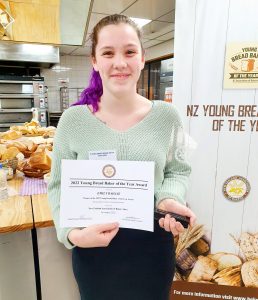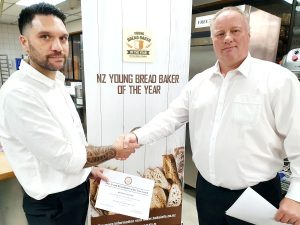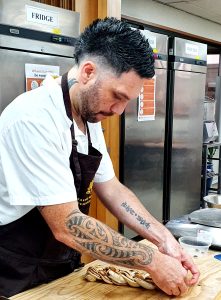 A Christchurch craft bread baker has won the 2022 Young Bread Baker of the Year Award after two days of demanding theoretical and practical testing.
A Christchurch craft bread baker has won the 2022 Young Bread Baker of the Year Award after two days of demanding theoretical and practical testing.
Emily Baillie, a baker at Bohemian Bakery in Christchurch, has been awarded a $10,000 research grant from the New Zealand Association of Bakers. Runner-up is Mike Malloy from Quality Bakers Auckland who receives a $5,000 research grant.
Emily, a 20-year-old baker in the third year of her apprenticeship, produces breads and pastries at Bohemian Bakery’s two Christchurch locations. Originally from Hokitika on the West Coast, where she started her apprenticeship at Stone Oven Bakery, Emily moved to Christchurch to broaden her experience. She says working with people of many different nationalities at Bohemian Bakery is a good way to learn different styles and skills, and their diverse backgrounds are reflected in the bakery’s products.
Emily heard about the Young Bread Baker of the Year Competition from her NZ Bakels representative. “I told her that if she thought I could do it, put me in,” says Emily. She spent time working on her theory knowledge and doing practical training with a NZ Bakels tutor. She says she loves a challenge and learning new ways to do things, and the competition was the perfect place for her to do just that.
“Winning the competition will really kickstart my career and open so many new doors for me. The research grant will give me the opportunity to learn much more about the science behind the techniques and ingredients which is a part of the industry I’m passionate about expanding my knowledge on.”
 Judging Co-ordinator Tania Watson says Emily won because she did well in both theory and practical sections. “We’ve invited her back next year to try out to be a representative at the 2024 LA Judge Competition in Australia.”
Judging Co-ordinator Tania Watson says Emily won because she did well in both theory and practical sections. “We’ve invited her back next year to try out to be a representative at the 2024 LA Judge Competition in Australia.”
 Runner-up Mike Malloy, a Production Manager at Quality Bakers in Auckland, entered the competition to challenge himself to keep his hand in with practical baking skills and the opportunity to network with the other competitors. Mike says he will use his research grant to look at bakeries and baking elsewhere. “I’m really interested in seeing overseas plant bakeries and the latest products.”
Runner-up Mike Malloy, a Production Manager at Quality Bakers in Auckland, entered the competition to challenge himself to keep his hand in with practical baking skills and the opportunity to network with the other competitors. Mike says he will use his research grant to look at bakeries and baking elsewhere. “I’m really interested in seeing overseas plant bakeries and the latest products.”
The competition requires entrants to demonstrate their ability in three areas: a presentation on a given research topic, a 90-minute exam which tests their theoretical knowledge of baking technology, and a five-hour practical session in which they bake a variety of bread-based products.
Judging Co-ordinator Tania Watson says the aim of the competition is to find bakers with potential whose talents can be nurtured through mentoring and development opportunities, and to reward the best young bread baker in the country. “It’s always good to have both plant and craft bakeries represented as they bring different strengths to the competition. This year we had four craft bakers and two plant bread bakers taking part. We were pleased to have bakers from diverse background and a variety of nationalities.”
Judges Joe Jarkiewicz, Grant Inns, Nathan Roberts, and Tania Watson said they like to see competitors showing confidence in their work. “They also need to be well organised and have a clean and tidy workspace,” says Joe Jarciewicz, “as well as an awareness of their surrounding and ability to work as a team. They need to communicate with each other to share the equipment and ovens in the kitchen. They must get the basics right and demonstrate skills such as hand moulding and scaling. Finally, the finished products have to be really good.”
The Judges said they were impressed in general with the standard of products. The competitors worked well together in the bakery and were calm and methodical in their approach. Grant Inns says the competition is an opportunity for competitors to get to know each other, form networks and advance their careers in baking.
The Young Bread Baker of the Year Competition is sponsored by the New Zealand Association of Bakers and is designed to promote excellence in people emerging from their training.
ENDS ///
Images
Jpeg: Emily Baillie wins
Caption: “Emily Baillie is the 2022 Young Bread Baker of the Year”
Jpeg Emily’s products
Jpeg: Mike in action
Caption: “Runner-up Mike Malloy in action during the competition”
Follow us on Facebook: Young Bread Baker of the Year
For more information, please contact
Tania Watson – Judging Coordinator
New Zealand Association of Bakers
E: tania@bakingresearch.org.nz
M: 021 1659949

